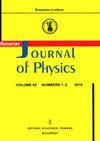在低水平放射性检测中优化 HPGE 检测器效率的步骤
IF 1.2
4区 物理与天体物理
Q3 PHYSICS, MULTIDISCIPLINARY
引用次数: 0
摘要
"不同的经验和理论方法用于精确确定放射性核素活度浓度。本研究使用蒙特卡罗模拟 MCNP5 代码和 EFFTRAN 软件(效率转移)来确定 HPGe 探测器的全能量峰(FEP)效率。测量了固定在标准几何形状塑料容器顶部的一组点源(133Ba、152Eu、137Cs、60Co 和 22Na),以获得校准曲线。由于化学成分参数的重要性,研究了不同基质对探测器行为的影响。使用添加了 152Eu 和 133Ba 的 IAEA-TEL-2021-03 质量控制水样对校准进行了实验验证,并将结果与报告结果进行了比较。方法验证使用了一组认证标准参考样品。所得结果与实验结果进行了比较。比较明确了这两种方法的优缺点及其精确度,从而证明了这两种方法适用于基质类型"。本文章由计算机程序翻译,如有差异,请以英文原文为准。
Steps Toward Optimizing HPGE Detector Efficiency in the Context of Low-Level Radioactivity Detection
"Different empirical and theoretical methods are used to precisely determine radionuclide activity concentrations. This study used Monte Carlo simulation MCNP5 code and EFFTRAN software (Efficiency Transfer) to determine the HPGe detector Full-Energy Peak (FEP) efficiency. A set of point sources (133Ba, 152Eu, 137Cs, 60Co, and 22Na) fixed on the top of the standard geometry plastic container were measured in order to obtain the calibration curve. Because of the importance of chemical composition parameters, the detector behavior due to different matrices was investigated. Experimental verification of the calibration was obtained using IAEA-TEL-2021-03 quality control water sample spiked with 152Eu and 133Ba, and the results were compared with reported results. A set of Certified Standard Reference samples were used for method validation. The obtained results were compared with the experimental results. The comparison clarified the advantages and disadvantages of both methods and their precision to demonstrate and suitable method for matrix types."
求助全文
通过发布文献求助,成功后即可免费获取论文全文。
去求助
来源期刊

Romanian Journal of Physics
物理-物理:综合
CiteScore
2.30
自引率
26.70%
发文量
0
审稿时长
4-8 weeks
期刊介绍:
Romanian Journal of Physics was first published in 1992 as a continuation of the former Revue Roumaine de Physique (ISSN: 0035-4090), a journal publishing physics and engineering scientific papers established 1956 with deep roots in the early history of the modern Romanian physics.
Romanian Journal of Physics is a journal of the Romanian Academy published by Editura Academiei Romane (eA). The journal has an international character intended for the publication of original physics contributions from various sub-fields including the following:
-Theoretical Physics & Applied Mathematics
-Nuclear Physics
-Solid State Physics & Materials Science
-Statistical Physics & Quantum Mechanics
-Optics
-Spectroscopy
-Plasma & Laser Physics
-(High Energy) Elementary Particles Physics
-Atomic and Molecular Physics
-Astrophysics
-Atmosphere (Environmental) & Earth Science
-Environmental Protection
 求助内容:
求助内容: 应助结果提醒方式:
应助结果提醒方式:


